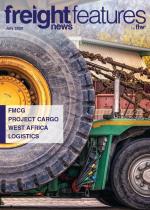Improved productivity, increased safety and reduced costs are the offering of Performance Based Standards (PBS) vehicles.Commonly referred to as smart trucks, they continue to prove more efficient when compared to conventional trucks, says Adrian van Tonder, senior manager: technical at Barloworld Transport.
“They improve efficiency by reducing costs associated with goods transport while delivering value to customers. From reducing road wear and greenhouse gas emissions, to managing the heavy traffic on South Africa’s road infrastructure and improving road safety, smart trucks offer more benefits as they are not constrained to prescriptive standards,” he explains.
South African legislation limits truck and trailer design to a prescriptive standard, governed by mass and dimensions, thus placing constraints on productivity and innovation.Van Tonder notes that with smart trucks the focus is on designing a truck and trailer combination based on how it performs on the road, its capability and not what it looks like – placing emphasis on combination stability. In this case, performance-based standards supersede certain aspects of the prescriptive standards. “Since the first pilot in 2007, South Africa continues to lead the pack in PBS vehicles outside of Australia and New Zealand,” he says.
“We really have made our mark compared to other countries with regard to smart trucks. Great progress has been made over the years, and as the only African country with PBS vehicles on the road, South Africa is about ten years ahead of Europe, America, Sweden and Germany.”According to the CSIR, there are currently 300 PBS vehicles as well as approximately 300 000 standard commercial vehicles on South African roads.“At Barloworld Transport, we have grown our smart truck f leet to 80 vehicles this year,” says Van Tonder. “We have saved 5 800 trips this year to date, while moving the same amount of payload.
A total of over 800 000 litres of diesel was saved.”Trailers for smart trucks are designed to achieve a low centre of gravity, and in certain instances, incorporate additional axles and tyres to improve stability and safety. “One of the key differentiators between a conventional truck and a smart truck is the axles on the trailer. The trailers could be slightly longer, but the width of the trailer and axle loads are subject to current legislation to protect the infrastructure,” says Van Tonder.A smart truck length can be less than 22 metres long and conforms to South African standards from a height and width point of view, with extra axles.
“When the abnormal bridge formula is applied, in instances where a standard side tipper can load 36 tonnes of product, a smart truck can load 50 tonnes,” he says. Results from the road-wear assessments on this combination show that per ton of payload moved, road-wear is about 50% less than a standard legal side tipper because of the extra axles and double-wheel tyres on a smart truck. In essence, it carries 14 tonnes more but has 50% less road-wear per ton of payload moved.According to Van Tonder there is still a need to get more logistics and transport companies onboard. “With so much progress made, South Africa ought to expand, grow and thrive in industries other than timber, mining and fuel when it comes to PBS vehicles.”

